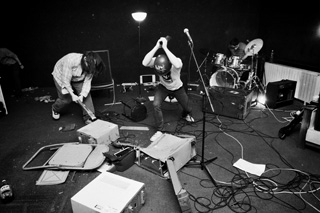Bamseom Pirates, Seoul Inferno
 KOREA / 2017 / Korean / Color, B&W / Blu-ray / 119 min
KOREA / 2017 / Korean / Color, B&W / Blu-ray / 119 min
Director, Script, Editing: Jung Yoon-suk
Photography: Heo Chul-nyeung
Producer: Jo Sona
World Sales: M-Line Distribution
Jang Sung-gun and Kwon Yong-man are the grindcore duo Bamseom Pirates. The group puts the spotlight on South Korea’s social issues at shows performed at universities, on the street, in buildings set for demolition, and at a rally to commemorate the Jeju Massacre. At the same time, this versatile and yet candid duo shouts out the angst felt by South Korean youth. The film, which merges with the songs of the band’s album Seoul Inferno, plays out like a road movie, full speed ahead at first; but one day in 2012, their close friend and producer is arrested on suspicion of violating the National Security Law . . . .
[Director’s Statement] In contrast to bands that regularly play at the hip clubs in Seoul, Bamseom Pirates have performed predominantly in marginalized venues such as deserted playgrounds, small local communities, sites of forced eviction, and anti-nuclear demonstrations in Japan. The film considers Bamseom Pirates’ journey in the context of a South Korea divided between city and the countryside, and shadowed by a tendency to equate urban development with praise-worthy growth. At the same time, Bamseom’s concerts on Jeju Island and in Japan were at the center of the politically controversial issues of energy, national security, and sovereignty in East Asia. Their journey reached its peak when Park Jung-geun, a friend and a producer of the Bamseom Pirates, was arrested and charged with violating the National Security Law. Once Park was arrested, my initial plan—to investigate South Korean youth culture by following the footsteps of the Bamseom Pirates—required a massive revision. The band’s debut album, Seoul Inferno, was used as evidence in the trial of Park Jung-geun, and Kwon appeared as a witness.
On the Korean peninsula, where the last remaining communist regime goes head to head with its capitalist brother, there is no middle ground. Even though the violence of undemocratic, repressive, and antagonistic Cold War ideology still resounds in the post-Cold War era, Park Jung-geun’s “Kim Jong-il Car Sex” tweet and Bamseom Pirates’ album “Seoul Inferno” act as bright red flags, opening doors to the post-post-Cold War era. Looking at the fragments left behind in our rigid contemporary society, I am trying to reassemble them into something new.
 Jung Yoon-suk
Jung Yoon-suk
Born in 1981 in Seoul, South Korea, Jung has a BFA in Visual Arts Studies and an MFA in Documentary Filmmaking from the Korea National University of Arts. As an artist and a filmmaker, he has continued to ask critical questions about the public nature of the state and society through art and documentary. His artistic projects and short films were exhibited at the Vancouver Film Festival in 2010 and the Gwangju Biennale in 2012. His debut feature, Non-Fiction Diary (2013), which deals with Korea’s first serial murder case in the 1990s, won various international awards including the Mecenat Award for Best Korean Documentary at the 2013 Busan International Film Festival, the Noves Visions Award for Best Feature Length Non-Fiction Film at the 2014 Sitges International Fantastic Film Festival in Catalonia, and the NETPAC Award at the 2014 Berlin International Film Festival.
